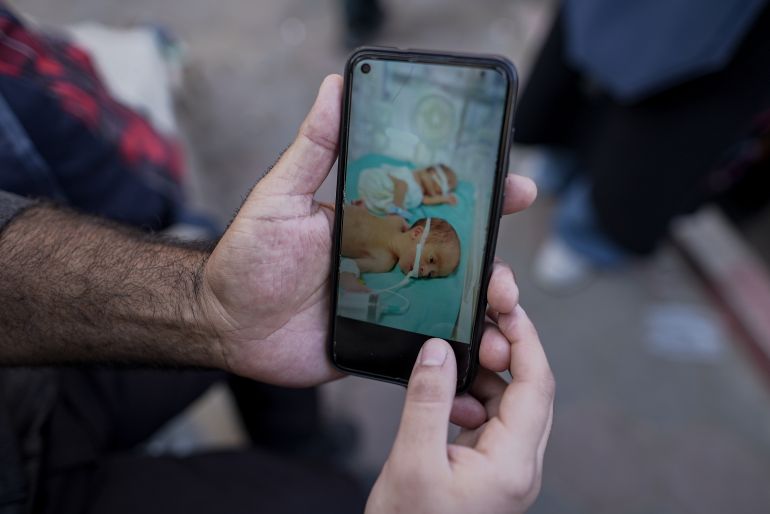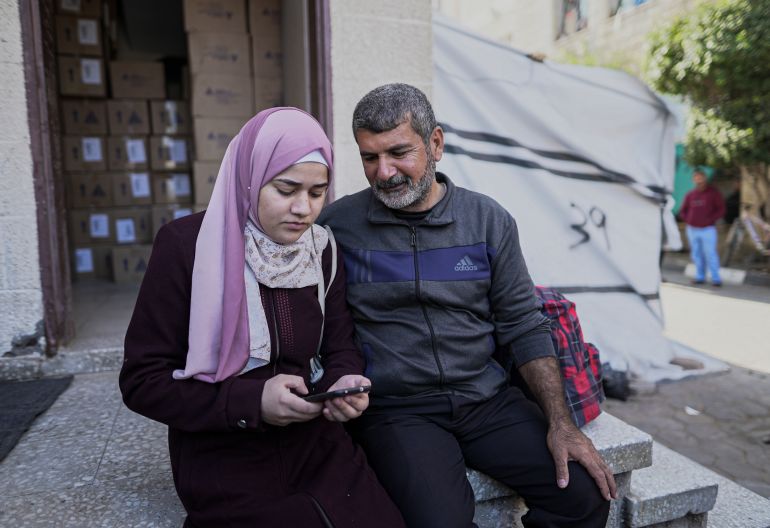Central Gaza Strip – When Noor Reyhan gave birth to her baby boy, the 20-year-old had no idea it would be the first and last time she would see him for two months.
Noor had gone into labour eight months into her pregnancy and gave birth on October 6 at al-Shifa Hospital in Gaza City.
“Because he was premature, I didn’t have the chance to see him,” Noor said. “The doctors took him immediately to put him in an incubator. I only have a photo of him.”
The next day, all hell broke loose. Israeli forces bombarded northern Gaza indiscriminately, a few hours after Hamas fighters attacked army outposts and Israeli towns just outside the strip.
Living in the northern town of Beit Lahiya, Noor and her husband, Huthaifa Marouf, knew from previous Israeli offensives that their area would be targeted. So they left their home and took refuge at a school in the Nuseirat refugee camp, where Noor could not even find a mattress and instead slept on a blanket on a cold classroom floor with 40 other people.

“We have been displaced since the beginning,” Noor said. “Our house was destroyed in the first week after the Israelis targeted our neighbourhood. Even before I became pregnant, we had prepared the nursery room in our home. That’s all gone now.”
The new parents tried to take their baby with them but were told they would be risking his life. Besides, relatives and doctors told them that, according to the rules of war, a hospital would be the safest place.
They named their son Ayman – which means blessed, righteous or lucky – weeks after he was born. For the next several weeks, they wouldn’t know if he was even alive.
Babies left behind
In the second week of November, Israeli forces besieged al-Shifa Hospital. Over the course of several days, the hospital was targeted several times, terrorising thousands of displaced families sheltering there and forcing them to leave.
Among the dozens of premature babies in the hospital were Ayman and twin girls Rateel and Raseel. Unlike Noor and Huthaifa, Sawsan Abu Odeh, the mother of Rateel and Raseel, was sheltering in al-Shifa. But as the bombardment of the hospital intensified, the 20-year-old had to leave.

“That was the day the Israelis threw leaflets telling people to head south,” Sawsan said. “I saw them [the twins] every day for a month and would pump milk to give to them, but I couldn’t hold them.”
A week earlier when the fifth-floor maternity ward of the hospital was hit by an air strike, Sawsan told the doctor at the neonatal intensive care unit (NICU) that she wanted to take her twins out of the incubators and head south.
“He said it was too dangerous to move them and that they would die if I took them with me because they were still taking nutrition intravenously,” she said. “He pointed out that the gunpowder in the air and the dust and dirt in general would impact their health even more and assured me that the safest place for them was the hospital.”
As they talked, the hospital grounds next to the NICU were bombed. The doctor took his wife and children, who were staying with him in the hospital, and fled.
The next day, Sawsan and her father, Khaled, were coming back to the hospital after going to the market to buy clothes for the twins. As they made their way towards the entrance gate, an Israeli missile struck it.
“A man only a few metres away from me was injured in his leg – there was a big chunk missing,” Sawsan said. “Another man close to us was wounded in his shoulder. My father grabbed me, and we fled from the hospital.”
The young mother was hysterical. She had given birth just a few weeks before with some complications and now found herself on the road leading to the southern Gaza Strip with thousands of other people.
“I kept stopping and crying and told my family that I didn’t want to go on, that they should continue without me,” she said. “We passed by the soldiers and their tanks and saw many bodies lying on the road. One of the bodies was burned black, and I saw two decomposing bodies in an abandoned car as well.”
Her mother flagged down a donkey cart and put her daughter on it until they reached the Maghazi refugee camp, where once again they took shelter in another school.
“It was horrible,” Sawsan said. “The bathrooms were filthy. There was no food. I wasn’t in a good state, and I blamed my dad for making me abandon my babies.”
As she spoke, her father, Khaled, let out a sad chuckle.
After they arrived at Maghazi, worried about his daughter’s state of mind, he set about asking around for news of the premature babies left at al-Shifa Hospital.

“For weeks, we had no idea where the girls were,” he said. “We called every hospital, but they gave us conflicting news. Some said they were taken to an Israeli hospital, others to the hospital in Ramallah.”
Sawsan’s fear intensified after reports emerged that several of the premature babies at the hospital had died.
She got in touch with the ambulance services, who referred her to the Red Crescent. It told her to contact the Red Cross, which eventually referred her along to the Ministry of Health in Gaza. After many attempts because of the bad phone lines, she also tried to get in touch with a doctor who had been in the NICU at the time that the Israeli forces raided the hospital.
“He told me that after they were forced out of the hospital, they didn’t have time to take the files of the premature babies with them,” she said. “But he assured me that the girls were alive and fine and had been taken to Egypt.”
‘He was emaciated’
Noor and Huthaifa have also been on an emotional rollercoaster ride since they were forced to flee northern Gaza. They had lost their home and didn’t know if Ayman was even alive.
“He was about a month old when the Israelis besieged al-Shifa Hospital, and I couldn’t see him or even be close to him,” Noor said, describing how she woke up every day thinking her baby’s last day on Earth had come. “My postpartum depression was at its peak, my mental health plummeting, and I was scared by the war, scared of my family getting killed, scared for my child who I couldn’t even see or hold.”
When Israeli forces stormed the hospital, Noor lost all hope. Israeli soldiers ordered the doctors, patients and displaced people to evacuate the medical compound, forcing some to leave at gunpoint.
When she heard reports that some of the premature babies had died, she cried nonstop.
Then a glimmer of hope emerged. On November 19, there was news that 31 of the 39 premature babies were being transferred to the Emirati Hospital in the southern city of Rafah.
Huthaifa made his way to the coastal Rashid Street as rain, bullets and missiles thundered on, hoping to catch the convoy of ambulances. His father-in-law travelled to Rafah and a few hours later, Huthaifa met him in front of the hospital entrance. Some of the parents of the other premature babies had also gathered there, and after much negotiating with the hospital staff, they made their way in.
But Huthaifa was not prepared for the terrible condition of the babies. He recognised his son somewhat, knowing he had no wrist or ankle band, assured by the name of Noor that was stuck on a card on the incubator. But as he stared at his baby, he gripped his head in anguish.
![Ayman Marouf, Noor and Huthaifa's baby boy, was in a starved condition on November 19 2023 after he was transferred from al-Shifa Hospital to the Emirati Hospital in Rafah, southern Gaza Strip [Suleiman al-Farra/Al Jazeera]](https://www.aljazeera.com/wp-content/uploads/2023/12/DSC03522-1702391565.jpg?w=770&resize=770%2C514&quality=80)
“He was emaciated,” Huthaifa, 24, said, his eyes watery. “Skin and bones. I told Noor on the phone he was alive and healthy. But he looked like he was in a famine.”
Ayman’s tiny ribcage was protruding from under his wrinkled skin. His bony shoulders were prominent, his eyes large and hollow. But he was alive.
“I wondered about my son,” Huthaifa said. “How did his tiny ears receive the constant bombardment? How did his small nose smell the gas and gunpowder in the air?”
Ahmad Shatat, the doctor responsible for the premature babies at the Emirati Hospital in Rafah, told Al Jazeera that they had all arrived in a malnourished state.
“The babies had intestinal disorders, which result in vomiting and diarrhoea, and rapid heartbeats due to their exposure to germs and infections,” he said.
Shatat added that, although official figures are hard to come by because of the war, the number of women giving birth prematurely has risen sharply due to the effects of war and lack of proper care and diet.
After hearing her son was alive, Noor wanted to come to Rafah the same night, but Huthaifa convinced her it was too dangerous to travel and she should come first thing the next morning. As he made his way to the hospital the next day on November 20, he received stunning news. The doctors told him they had transferred the babies to Egypt.
When Noor found out, she broke down.
“Imagine the feeling of a new mother finally about to see her newborn child who she hadn’t seen for a month and a half, only to be told that he has been taken to another country,” she said. “I cried and screamed and wailed, thinking my baby was lost forever.”

‘Alive and well’
The Health Ministry added the names of Noor and Sawsan to a list of urgent medical travellers. On December 5, they were told their names were on the list for travel, and they both went to Al-Aqsa Martyrs Hospital in Deir el-Balah, where an ambulance was waiting to take them to the Rafah border crossing.
Their hearts in their mouths, the mothers took their seats next to the driver, each with a small bag in her lap.
“I’m very excited to see my girls but also very anxious,” Sawsan said. “It’s my first time travelling outside the Gaza Strip. I am scared of what could happen to them if I am killed or if they are kidnapped in Egypt.”
Khaled kissed her goodbye on the cheek. Next to her, Noor hugged her blue bag, which was full of baby clothes.
“It’s my heart’s desire to go with Noor,” Huthaifa said. “I’m glad I got to see him, though, and she will be over the moon, of course.”
The next day, exactly two months after she gave birth, Noor finally held her baby, Ayman, in her arms at El Arish Hospital in Egypt. She sent photos and videos to her husband and family, her smile never leaving her face.
“I was so scared I wouldn’t see my son because of the genocide,” she said. “I hope the war ends, and we both can go back to Gaza.”
Sawsan had to wait an extra day to see Rateel and Raseel after staff at El Arish Hospital told her that her girls had been taken to a hospital in Cairo. Because it is illegal for Palestinians from Gaza to travel through Egypt without a visa, an ambulance was arranged to take Sawsan on the six-hour journey through the Sinai desert to the capital.
“My girls are alive and well,” she told Al Jazeera by phone from Cairo.
Source : AL JAZEERA















